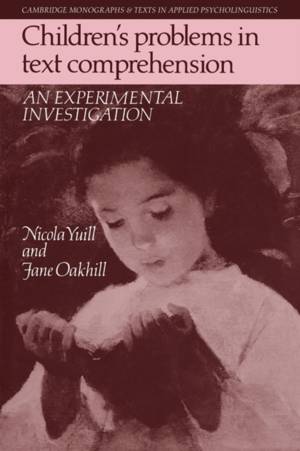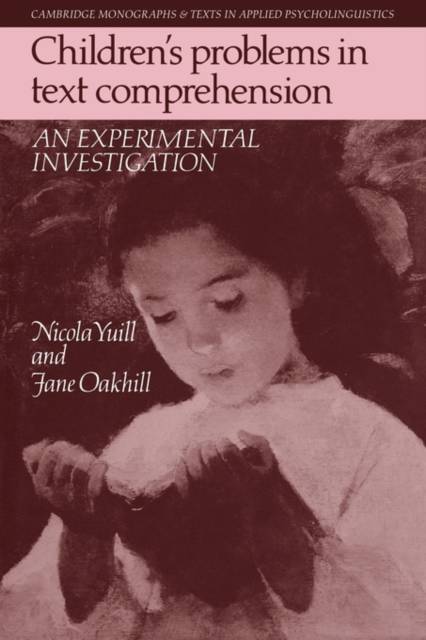
Bedankt voor het vertrouwen het afgelopen jaar! Om jou te bedanken bieden we GRATIS verzending (in België) aan op alles gedurende de hele maand januari.
- Afhalen na 1 uur in een winkel met voorraad
- In januari gratis thuislevering in België
- Ruim aanbod met 7 miljoen producten
Bedankt voor het vertrouwen het afgelopen jaar! Om jou te bedanken bieden we GRATIS verzending (in België) aan op alles gedurende de hele maand januari.
- Afhalen na 1 uur in een winkel met voorraad
- In januari gratis thuislevering in België
- Ruim aanbod met 7 miljoen producten
Zoeken
Children's Problems in Text Comprehension
An Experimental Investigation
Nicola Yuill, Jane Oakhill, Yuill Nicola
€ 64,95
+ 129 punten
Uitvoering
Omschrijving
Although some young children can read aloud with apparent fluency, they fail to understand fully or remember connected discourse. Much research on reading has focused on problems at the word recognition level and less attention has been given to comprehension difficulties. The authors of this 1991 work observed that teachers usually monitored reading ability by listening to children read aloud, or by using reading tests that concentrate on word recognition skills. Thus, comprehension problems could go unnoticed. The authors provide an introduction and an overview of adult and child text comprehension. They then describe their own research on children who have a specific comprehension deficit. Such children have difficulties in making inferences from text, in using working memory to integrate information into a coherent mental model and in reflecting on their own comprehension. The authors relate these findings to educational practice and make suggestions for comprehension improvement. Psychologists and educators will welcome this presentation of fresh, thorough research on an important topic.
Specificaties
Betrokkenen
- Auteur(s):
- Uitgeverij:
Inhoud
- Aantal bladzijden:
- 256
- Taal:
- Engels
- Reeks:
Eigenschappen
- Productcode (EAN):
- 9780521125796
- Verschijningsdatum:
- 14/01/2010
- Uitvoering:
- Paperback
- Formaat:
- Trade paperback (VS)
- Afmetingen:
- 152 mm x 226 mm
- Gewicht:
- 408 g

Alleen bij Standaard Boekhandel
+ 129 punten op je klantenkaart van Standaard Boekhandel
Beoordelingen
We publiceren alleen reviews die voldoen aan de voorwaarden voor reviews. Bekijk onze voorwaarden voor reviews.









